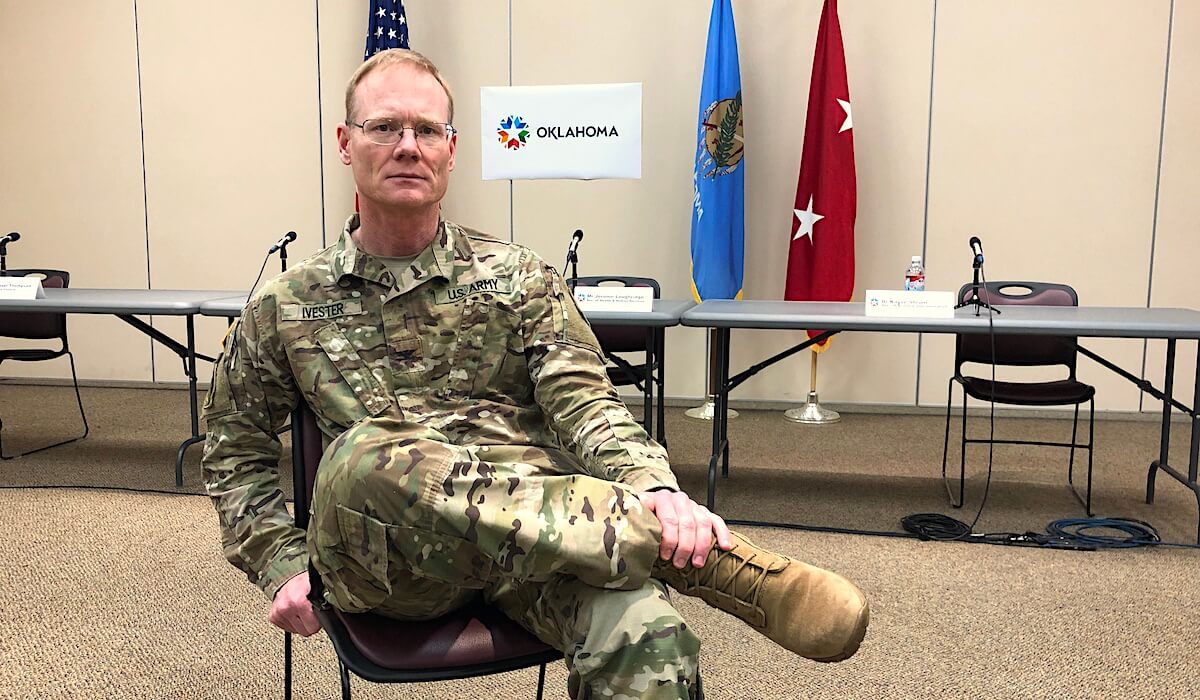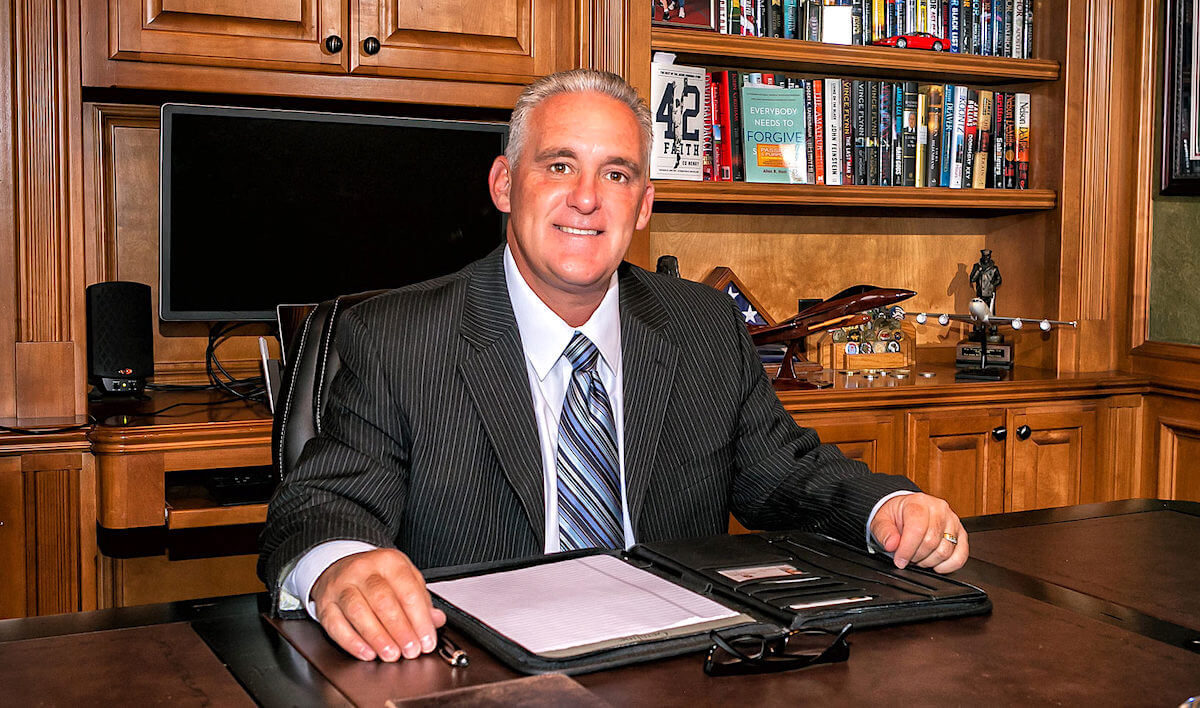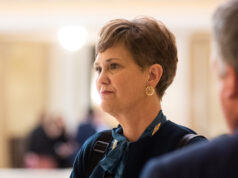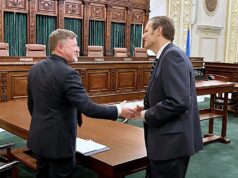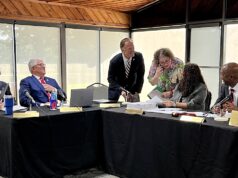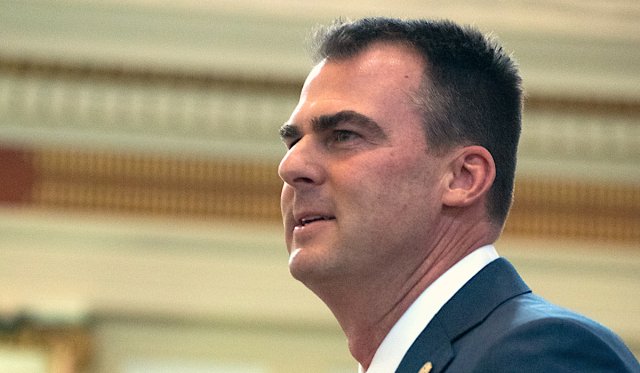
Two days after he acknowledged the “possibility” of having to implement statewide limitations for private businesses, Oklahoma Gov. Kevin Stitt announced five new orders aimed at slowing the spread of COVID-19.
During a 2 p.m. press briefing today accessible by phone and Zoom videoconference, Stitt revealed the additional steps intended to extend social distancing:
- a statewide shelter-in-place policy branded as “safer at home” for Oklahomans age 65 or older and those with underlying health issues compromising their immune systems. Ordered through April 30, the policy is intended to guarantee employment protections for older Oklahomans and limit their travel to essential locations such as grocery stores and pharmacies;
- operation adjustments after 11:59 p.m. Wednesday, March 25, for “non-essential” businesses in counties identified as having “community spread” of COVID-19. In counties that feature confirmed cases, any socially-driven business will be required to close its common areas for 21 days. Currently, the rules affect 19 counties but would expand upon further diagnosis across the state;
- a 14-day suspension of non-urgent and non-emergent medical services statewide to conserve personal protective equipment such as gloves, masks and n95 respirators;
- suspension of all visitation to nursing homes and longterm care facilities;
- prohibit “social gatherings” of more than 10 people.
“I remain committed to making decisions based on reliable data, the emerging science and the advice of experts,” Stitt said from a podium inside the Oklahoma National Guard Regional Training Institute. “I don’t make these decisions lightly. I know this affects all 4 million Oklahomans.”
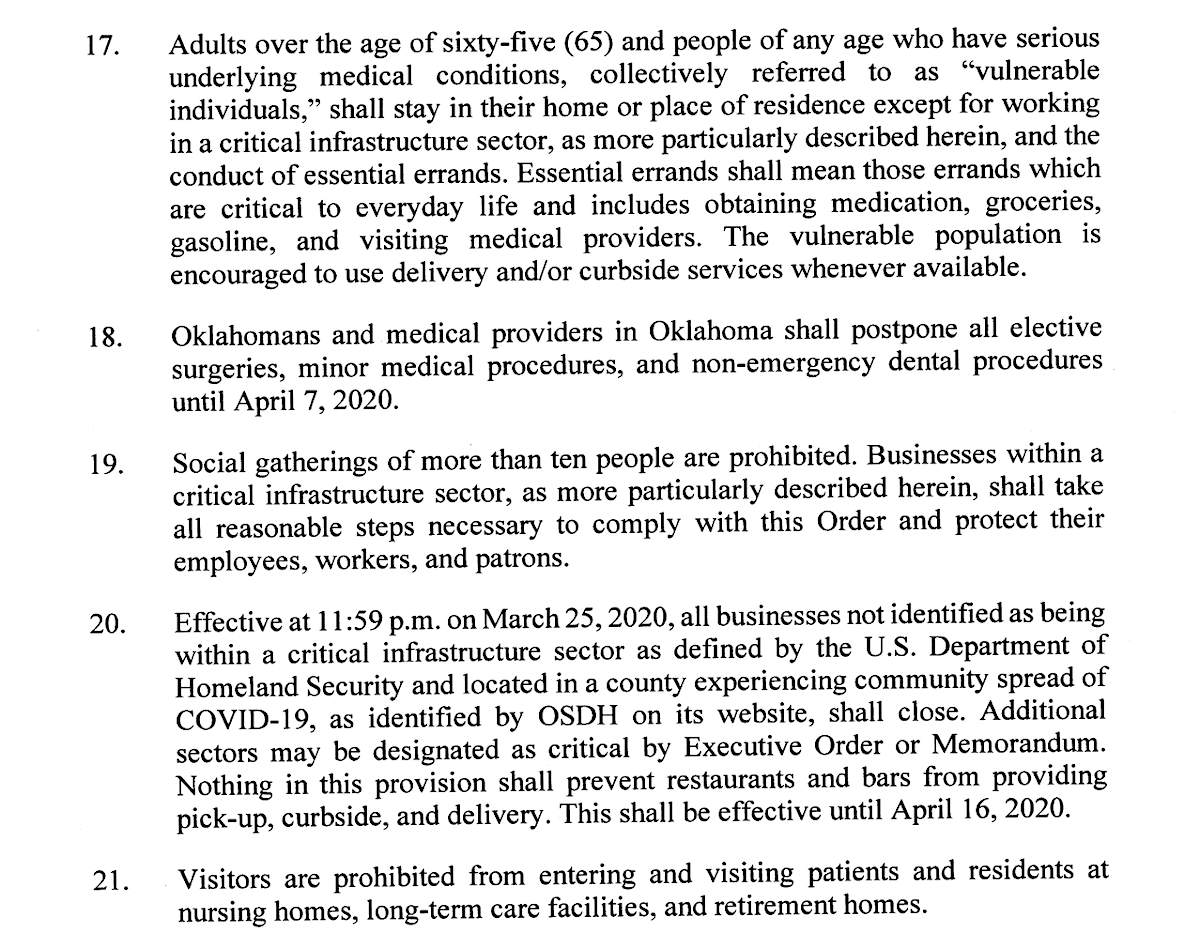
Stitt actions intended ‘to reduce the spread and flatten the curve’
While 109 cases of COVID-19 are confirmed in the state currently, Stitt said he believes the actual numbers are closer to 500 and that “they are going to get into the thousands.”
“Today, we are taking some more actions to reduce the spread and flatten the curve,” Stitt said.
Most of Oklahoma’s largest municipalities had already taken measures to close bars and theaters, limit restaurants to takeout orders and encourage social distancing, a practice intended to slow the transmission rate of COVID-19 and avoid overwhelming hospital capacities. But even though Oklahoma City — the county seat of Oklahoma County — implemented those restrictions last week, suburban governments had not followed suit despite the county’s community spread of the novel coronavirus.
Asked if the shelter-in-place order for older and immunocompromised Oklahomans will feature enforcement mechanisms, Stitt emphasized his belief in the responsibility of local residents.
“I’m not worried about Oklahomans complying. Oklahomans are complying,” Stitt said. “They are looking for us to give them the recommendations, so that is what I am doing.”
He said designations of businesses as “essential” and “nonessential” are determined by federal guidelines, which can be found here. Media in other states have provided breakdowns of the same topic. He said the specific language of his newest executive orders will be released later in the day. Shortly after 5:30 p.m., his updated executive order appeared online. Over the next 24 hours, he added several supplemental definitions of “essential” professionals, including health care, law enforcement, financial services, legal services, transportation, water and numerous community-based sectors.
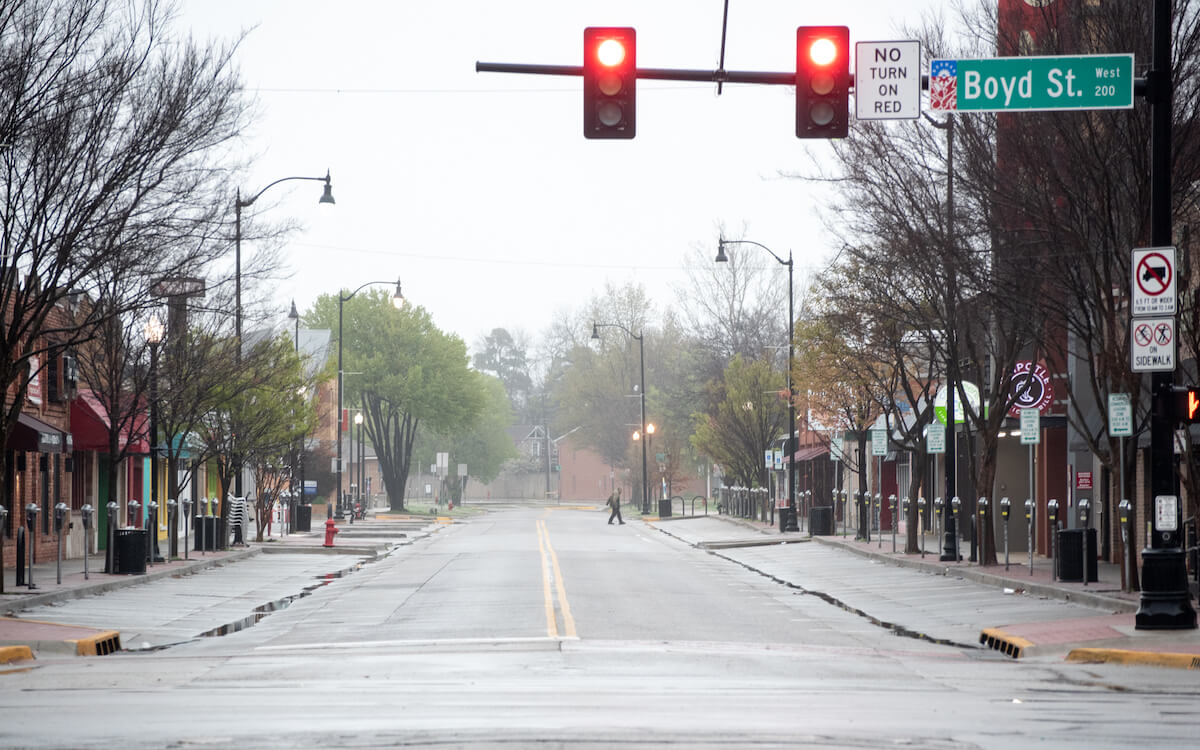
Stitt pushed to act by health care organizations
Monday evening, 13 groups representing health care professionals and a senior-services advocacy organization sent Stitt a letter to “urgently request” the implementation of a “shelter-in-place policy” and the closure of “non-essential businesses.”
“While we applaud the hard work and efforts your administration has taken thus far, experience from the reset of the country and globally show that these measures are not enough,” the groups wrote. “More aggressive, proactive efforts are necessary if we are to stop the spread of this disease and prevent unnecessary deaths.”
In their letter first reported by Barbara Hoberock of the Tulsa World, the 14 groups bolded their primary request of the first-term governor.
“We urgently request that you issue an executive order that will implement a shelter-in-place policy and close non-essential businesses until this pandemic is truly contained,” the letter said.
During a Sunday night press conference, Stitt had acknowledged he eventually might go against his limited-government values and issue a statewide order restricting non-essential businesses.
“It’s a possibility. Everything is on the table as we are in uncharted territory,” Stitt said Sunday. “This is changing so rapidly as the CDC gives more recommendations to us. So we’ll take that as it comes.”
RELATED
Tom Ivester on COVID-19: ‘We are not immune in rural Oklahkoma’ by Tres Savage
The governor and his COVID-19 response task force are receiving daily updates from various state health officials, including new state epidemiologist Dr. Aaron Wendelboe. Asked after Sunday’s press conference whether a shelter-in-place policy might eventually make sense for Oklahoma, Wendelboe chose his words carefully.
“I think so. As the governor said, we are customizing the data. We are fortunate in Oklahoma to have our first case a week or two weeks after other states,” said Wendelboe, a former epidemic intelligence service officer for the U.S. Centers for Disease Control and Prevention. “This gives us an opportunity to learn from other states, and we are continually updating the model to fit what we are observing. We just want to be able to make those decisions at the right time because sometimes there are unintended consequences, so we just want to make sure we have thought through everything fully.”
Asked how he would expect Stitt to respond if he recommended that the governor close non-essential businesses and pursue a shelter-in-place policy, Wendelboe said he appreciates the “team approach” of Oklahoma’s COVID-19 response.
“The governor is the governor for a good reason, and I just am grateful that we have a team where we can look at many scenarios,” Wendelboe said.
Under his orders announced today, Stitt’s shelter-in-place policy looks different from those implemented in other states and cities where COVID-19’s impact started earlier and has grown larger. In California, New York, Louisiana and parts of Texas, including Dallas County, specific restrictions vary. In general, they require all nonessential businesses to close, and they ban citizens from leaving their homes except for necessities and walks in open areas. Some places have implemented fines and potential jail time for violations.
Follow @NonDocMedia on:
More COVID-19 cases confirmed, third death
This morning, the Oklahoma State Department of Health announced that there are now 106 confirmed cases of COVID-19 in the state, spread across 19 counties. Stitt said the number had climbed to 109 by Tuesday afternoon, a more than 30 percent increase over Monday’s count of 81. The department confirmed another death from the disease — a woman in her 60s, whose identity was not disclosed — which brings the statewide total to three.
RELATED
Oklahoma Sen. Paul Rosino tests positive for COVID-19 by Tres Savage
State lawmakers, who are adjourned indefinitely from the annual legislative session, are expecting the final four months of this fiscal year to feature a revenue failure. They are also expecting a shortfall for the next fiscal year’s state budget, which must be established before a constitutional deadline of May 29.
House Minority Leader Emily Virgin (D-Norman) had also called for statewide measures Monday, and after Stitt’s announcement Tuesday she said she will continue to do so.
“I’m grateful he has taken this action, but I will continue to push for these provisions to be enacted statewide,” Virgin said. “We have to be proactive to prevent the spread of this virus instead of reacting when we have positive cases.”
(Update: This story was updated at 3:15 p.m. Tuesday, March 24, to include comment from Virgin. It was updated again at 5:30 p.m. and again at 7:30 p.m. to include additional information. It was updated again at 5 p.m. Wednesday, March 25, to include Stitt’s additional supplemental definitions.)










